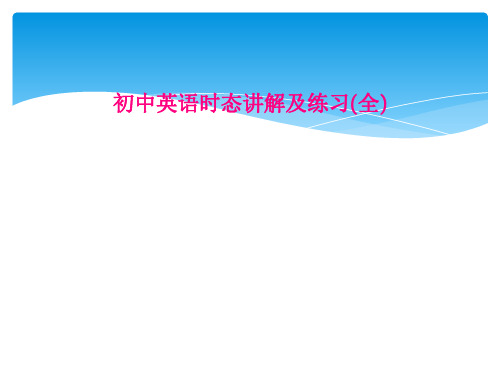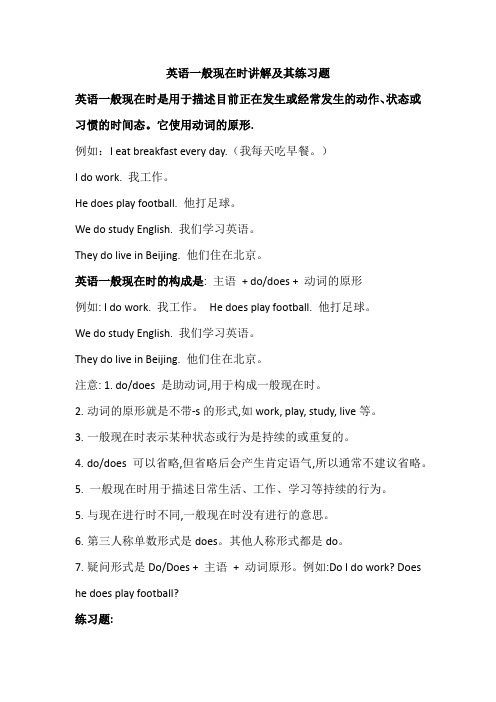一般现在时讲解及练习
- 格式:doc
- 大小:51.00 KB
- 文档页数:4


(完整版)大学一般现在时讲解及练习题大学一般现在时讲解及练题 (完整版)一、什么是一般现在时?一般现在时是指在陈述事件、事实或状态时,表达的是经常性、惯性或普遍性的行为。
例如:“我每天锻炼身体”或“他们喜欢看电影”。
二、一般现在时的构成一般现在时的肯定句结构:主语 + 动词原形 (+ 其他)一般现在时的否定句结构:主语 + do not/does not + 动词原形(+ 其他)一般现在时的疑问句结构:Do/Does + 主语 + 动词原形 (+ 其他)三、一般现在时的用法1. 表示客观事实、真理或普遍现象,常常与表示频率的副词一起使用。
例如:“水烧开时会冒泡”。
2. 表示经常性或惯性的行为。
例如:“我每天都喝咖啡”。
3. 表示现阶段的情况或状态。
例如:“我现在住在中国”。
4. 在叙述历史事件或小说情节时,使用一般现在时可以增加紧迫感和现场感。
例如:“他打开门,走进了房间”。
四、一般现在时的练题1. 填入适当的动词形式:- She ____(have) two cats.- They ____(go) to school every day.- My father ____(work) as a doctor.2. 句子改为否定句:- I eat breakfast every morning.- She likes to read books.- We play tennis on weekends.3. 根据题意回答问题:- When do you usually go to bed? - Does he watch TV every evening? - How often does she go shopping?4. 将下列句子改为一般疑问句:- You live in London.- They play football in the park.- She enjoys dancing.五、答案1. 填入适当的动词形式:- She has two cats.has two cats.- They go to school every day.go to school every day. - My father works as a doctor.works as a doctor.2. 句子改为否定句:- I do not eat breakfast every morning.- She does not like to read books.- We do not play tennis on weekends.3. 根据题意回答问题:- I usually go to bed at 11 PM.- Yes, he watches TV every evening.- She goes shopping once a week.4. 将下列句子改为一般疑问句:- Do you live in London?- Do they play football in the park?- Does she enjoy dancing.希望以上内容对你理解和练一般现在时有所帮助!如有任何问题,请随时向我提问。

一、定义与讲解一般现在时:表示经常性的事情,经常性的动作或一般性事实。
时间状语:often 经常,usually通常,always 总是,every每个,sometimes 有时,at …在几点钟只有在第三人称单数用动词的“三单变化”,其他用动词的原形。
三单变化:1.多数在动词后+s play — plays like — likes(1)直接在动词词尾加-s.ask---asks work---works get---gets stay---stays(2)以字母s, x, ch, sh或o结尾的动词,在词尾直接加-es.watch---watches wish---wishes fix---fixes do---doesgo---goes pass---passes(3)以“辅音字母加 - y”结尾的动词,要先变y为i再加-es.try---tries study---studies cry---cries fly---flies2.不规则变化:be---- is are have----has二、一般现在时用法1. 表示经常性,习惯性,永久性的动作或存在的状态.通常与副词sometimes, ofte n, usually, always, every day (year, month ), once (twice, three times) a da y,等时间状语连用。
They usually go to school by bike.I take the medicine three times a day.She helps her mother once a week.Mary’s father is a policeman.There are 50 students in my class.2. 表示客观真理,科学原理,自然现象,等客观事实或格言,谚语等。
The sun rises in the east and sets in the west every day.The man who has never been to the Great Wall is not a real man.Tomorrow is Tuesday.三、一般现在时的句子转换:(1)当句子中有be动词或情态动词时,则把be动词或情态动词(can,could等等)提到主语的前面变成疑问句;在be动词或情态动词后面加not变成否定句.例:①陈述句:She is a student.疑问句→ Is she a student?否定句→ She is not a student.②陈述句:I can swim.疑问句→ Can you swim否定句→ I can not swim.(2)当句子中即没有be动词,也没有情态动词时,则在主语前加助动词do (you,以及复数), does(单数she,he,it)变成问句;在主语后谓语动词前加助动词don’t(I, you,以及复数), doesn’t(单数she,he,it)变成否定句,助动词后的动词要变成动词原形。


英语一般现在时讲解及其练习题英语一般现在时是用于描述目前正在发生或经常发生的动作、状态或习惯的时间态。
它使用动词的原形.例如:I eat breakfast every day.(我每天吃早餐。
)I do work. 我工作。
He does play football. 他打足球。
We do study English. 我们学习英语。
They do live in Beijing. 他们住在北京。
英语一般现在时的构成是: 主语+ do/does + 动词的原形例如: I do work. 我工作。
He does play football. 他打足球。
We do study English. 我们学习英语。
They do live in Beijing. 他们住在北京。
注意: 1. do/does 是助动词,用于构成一般现在时。
2.动词的原形就是不带-s的形式,如work, play, study, live等。
3.一般现在时表示某种状态或行为是持续的或重复的。
4.do/does 可以省略,但省略后会产生肯定语气,所以通常不建议省略。
5. 一般现在时用于描述日常生活、工作、学习等持续的行为。
5.与现在进行时不同,一般现在时没有进行的意思。
6.第三人称单数形式是does。
其他人称形式都是do。
7.疑问形式是Do/Does + 主语+ 动词原形。
例如:Do I do work? Does he does play football?练习题:一.请改正下列句子中的语法错误并将其变为一般现在时:1.She always drink tea in the morning. -She always drinks tea in the morning.2.They don't likes to eat spicy food. - They don't like to eat spicy food.3.He go to school by bus every day. - He goes to school by bus every day.4. I usually listen music while I work. -I usually listen to music while I work.5.We doesn't have any plans for tonight. - We don't have any plans for tonight.二.请改正下列句子中的语法错误并将其变为一般现在时:1. She always drink tea in the morning. -She always drinks tea in the morning.2. They don't likes to eat spicy food. - They don't like to eat spicy food.3. He go to school by bus every day. - He goes to school by bus every day.4. I usually listen music while I work. -I usually listen to music while I work.5. We doesn't have any plans for tonight. - We don't have any plans for tonight.三.用动词正确的形式填空:1. She ___________ (watch) TV every evening. Answer: watches2. They ___________ (play) basketball on Saturdays. Answer: play3. He usually ___________ (get up) at 6 o'clock in the morning. Answer:gets up4. My sister and I ___________ (like) to read books before bed. Answer: like5. The sun ___________ (rise) in the east and sets in the west. Answer: rises6. We always ___________ (have) lunch at noon. Answer: have7. Tom often _________(go )to the gym after work Answer : goes8 .My mother _________(cook )delicious meals for us Answer : cooks9.He __________ (play) basketball every weekend. Answer: plays10.The cat __________ (run) after the mouse. Answer: runs11. She usually __________ (eat) breakfast at 7 o'clock. Answer: eats12. My sister always __________ (drink) coffee in the morning. Answer: drinks13. Tom often __________ (study) English for two hours every day. Answer: studies四. 请改正下面每个句子的错误,并将其改写成一般现在时。

六年级上册一般现在时知识讲解与专项练习一、一般现在时知识点【No. 1】概念:1.表不事物或人物的特征、状态。
如:The sky is blue.天空是蓝色的。
2.表示经常性或习惯性的动作。
如:I get up at six every day.我每天六点起床。
3.表示客观现实。
如:The earth goes around the sun.地球绕着太阳转。
【No.2】时间标志性词:every ... (every day/week/Sunday...)on+星期几(on Mondays/Tuesdays..)频度副词(always, usually often sometimes, rarely, seldom, never)【No.3】结构:①动词原形I like apples.②动词单三形式He plays football.③be动词I am a boy.有be无动(动:实义动词)①肯定句:主语+be+其他He is an English teacher.②否定句:主语+be not+其他He is not an English teacher.③一般疑问句:Be +主语+其他+...?Is he an English teacher?有动无be(动:实义动词)①肯定句:主语(非三单)+动词原形+其他I play football.主语(三单)+动词三单形式+其他He plays football.②否定句:主语(非三单)+don’t+动词原形+其他I don't play football.主语(三单)+doesn’t动词原形+其他He doesn't play football.③一般疑问句:Do+主语(非三单)+动词原形+其他?Do you play football?Does+主语(三单)+动词原形+其他?①肯定形式:主语十情态动词can/may+动词原形+宾语。
小学生一般现在时讲解及练习题一、一般现在时的用法一般现在时表示经常性的动作、惯、事实或真理。
以下是一般现在时的用法:1. 表示经常性的动作或惯- She brushes her teeth every morning.(她每天早上刷牙。
)- They always go for a walk in the park.(他们总是去公园散步。
)2. 表示普遍真理或事实- The Earth revolves around the Sun.(地球绕着太阳转。
)- Water boils at 100 degrees Celsius.(水在100摄氏度沸腾。
)3. 表示瞬间事件或现况- I love ice cream.(我喜欢冰淇淋。
)- The dog barks loudly.(狗叫得很大声。
)二、一般现在时的构成在一般现在时中,动词的变化相对简单。
1. 对于第三人称单数(He/She/It),动词要加-s或-es。
- He walks to school every day.(他每天走路去学校。
)- She eats an apple.(她吃一个苹果。
)- It runs fast.(它跑得很快。
)2. 对于其他人称(I/You/We/They),动词不变。
- I play soccer on weekends.(我周末踢足球。
)- You read books every night.(你每晚读书。
)- We go swimming in summer.(我们夏天去游泳。
)- They watch movies together.(他们一起看电影。
)三、练题请根据句意填入正确的动词形式。
1. My mother __________ (cook) dinner for us every evening.2. Tom and Lisa __________ (play) tennis on Saturdays.3. The sun __________ (rise) in the east.4. We __________ (study) English at school.5. Dogs __________ (bark) when they see strangers.1. cooks2. play3. rises4. study5. bark希望以上讲解和练习题对你有帮助!。
一、一般现在时有三种形式1. 谓语是be(am/is/are)的一般现在时。
①肯定形式:主语+be+表语(形容词、名词充当表语)。
I am hungry.You are beautiful.He is a doctor.②否定形式:主语+be+not+表语(形容词、名词充当表语)。
I am not hungry.You aren't beautiful.He isn't a doctor.③一般疑问句形式:Be+主语+表语(形容词、名词充当表语)? 肯定回答:Yes,主语+be. 否定回答:No, 主语+ be+not.—Are you hungry?—Yes,I am./No,I'm not.—Is he a doctor?—Yes, he is./No, he isn,t.④特殊疑问句形式:特殊疑问词+Be开头的一般疑问句?—What is he?—He is a doctor.注意:be要随着主语变。
2. 谓语动词是实义动词(及物动词或不及物动词)的一般现在时。
①肯定形式:“主语+及物动词+宾语”或“主语+不及物动词”。
She has a little brother.她有一个弟弟。
The sun rises in the east.太阳从东方升起。
②否定形式:“主语+don't/doesn't+及物动词+宾语”或“主语+don't/doesn't+不及物动词”。
She doesn't have a little brother.她没有弟弟。
I don't eat every morning.我每天早晨都不吃饭。
③一般疑问句形式:“Do/Does+主语+及物动词原形+宾语”或“Do/Does+主语+不及物动词原形”。
肯定回答:Yes,主语+do/does. 否定回答是:No, 主语+ don't/doesn't.—Do you eat every morning?—Yes, I do./No, I don't.—Does she have a little brother?—Yes, she does./No, she doesn't.④特殊疑问句:特殊疑问词+do/does开头的一般疑问句?What do you like?When do you go to school?注意:根据主语确定用do还是does。
一般现在时的讲解以及练习题一、含义一般现在时表示经常发生的、习惯性的动作,或存在的状态.1、表示经常性或习惯性的动作。
I get up at six〔6:30〕 every day.——我每天六点(6:30)起床。
He reads English every morning.——他每天早晨读英语。
2.表示现在的状态,或主语具备的性格、特征、能力等。
例:The sky is blue.——天空是蓝色的。
Tom studies very hard.——汤姆学习很努力。
She likes noodles.——她喜欢面条。
He’s twelve. ——他12岁。
They speak French.——他们说法语。
I am a teacher.——我是一名教师。
We are Chinese.——我们是中国人。
There are seven days in a week. 一周有七天.Two and four is six.二加四等于六。
start, e,go, leave, arrive, stay , return、等动词。
例如:My train leaves at 6:30 this morning.我乘坐的火车在今天早晨6:30离开。
How long do you stay here?你在这住多久?begin[bɪˈgɪn]v 开场,再来一次start [stɑ:rt]n& vi开场;动身;起点e[kʌm]v 来leave[li:v]n辞别、假期, v离开,出发arrive[əˈraɪv]v到达stay[steɪ]n& vi 停留,住下return[rɪˈtɜ:n]v.返回;送还;n.归来,返乡;二、一般现在时常用时间状语★3、次数★once[wʌns]adv.一次;一倍;曾经;conj.一旦…就…;n.一次,一回twice[twaɪs] adv.两次;两倍;两遍★ 4、频率副词★一般现在时常和never 、seldom、 rarely、barely、hardly、always, often, usually, sometimes等表示时间的状语连用1、never [ˈnevə(r)] adv.决不;从不,从来没有;【否认意义最强】2、seldom[ˈseldəm]adv.很少,偶尔,不经常【表示次数很少,=not offten,程度次于never】3、rarely[英][ˈreəli] adv.很少地,难得地,少见地 ,珍奇地【表示数量很少】barely[ˈbeəli]adv.仅仅,勉强,几乎不,几乎没有;赤裸裸地,公开地【强调勉强够数;】4、hardly[英][ˈhɑ:dli]简直不,几乎不,几乎没有【=almost not,强调困难.程度次于seldom】scarcely[英][ˈskeəsli][美][ˈskersli]adv.几乎不,简直不【scarely=hardly ,用在be/助动词后,强调数量和程度的缺乏】5、always [ˈɔ:lweɪz] adv.总是,永远,常常;【程度最强】6、usually adv.通常,经常,平常;一般;【程度稍次于always】7、often [ˈɔ:fn]屡次,时常,【程度次于usualy】8、sometimes[ˈsʌmtaɪmz]有时,【程度次于often】三、一般现在时的用法※★〔一〕、肯定句★※★1、句中有系动词be的一般现在时构成★主语+be+其它The girl is my friend. 这个女姟是我的朋友。
一般现在时Present Tense一、概念:表示通常性、规律性、习惯性的状态或者动作(有时间规律发生的事件)的一种时间状态。
拆开来讲就是:时间:指动作发生在“现在”的时间段内。
那么,多长的时间才叫“现在”呢?一天?状态:一般现在时最容易迷惑的一个问题,就是拿不准什么叫“经常发生的动作或存在的状态”?这个问题要分三层来讲:1.“经常发生的动作”,比如每天起床、吃饭、上学,一个星期去几次超市或新华书店等。
这些事件中,有的是有规律的,有的是偶尔做几次。
这些都算经常发生的事件。
我们要告诉人们的,是这个动作经常发生,是一般的情况而不是具体的某一次。
2.事物存在的状态。
3.有些动作或状态是永恒的,比如长江向东流、地球绕着太阳转,比如谚语中举的事例、文学作品中描绘的事例,像“好马不吃回头草”等等二、基本用法:1.表示经常性或习惯性发生的动作。
如:I always get up at 7 o’clock in the morning.我总是在早上7点起床。
We often read books at school.我们在学校经常看书。
They usually have dinner at 6:00 in the evening.他们通常在晚上6点吃晚餐。
2.表示现在的状态或特征。
如:She loves English very much.她非常爱英语。
We are always at home on weekends.周末我们总留在家。
Tom is an exellent player.汤姆是一位优秀的运动员。
3.表示客观的现实。
如:The sun rises in the east.太阳从东方升起。
Summer comes after spring.夏天在春天的后面4.用在按计划、规定或安排发生的事情。
如:The plane leaves at 9:30.飞机9点30分起飞。
Tomorrow is Sunday.明天是星期天。
一般现在时练习一、定义与讲解1.表示经常性、习惯性、永久性的动作或存在的状态。
常与时间状语连用。
时间状语:often 经常,usually通常,always 总是,sometimes 有时,every day (year, month )每个,at …在几点钟2.表示客观真理,科学原理,自然现象,等客观事实或格言,谚语等。
二、构成:主语 + 动词的原形/动词的单三形式 + 其他只有主语是第三人称单数时,用动词的“单三形式”,其他用动词的原形。
三、各种句型1.句子中含有be动词或情态动词:如:①陈述句:She is a student. ②陈述句:I can swim.否定句→ She is not a student. 否定句→ I can not swim.一般疑问句→ Is she a student? 一般疑问句→ Can you swim?特殊疑问句:特殊疑问词+be动词/情态动词+主语+ 其它?如:How are you?/What’s your name? What can you do?2.句子中谓语动词是实义动词:①主语是第三人称单数(she/he/it/the boy/Zhang Peng......)如:陈述句:My father likes reading books.否定句:My father doesn’t like reading books.一般疑问句:Does your father like reading books?特殊疑问句:特殊疑问词+ does + 主语+动词原形+其它?如:How does your father go to work?②主语不是第三人称单数(I/You/They/The students......)如:陈述句:I go to school at 7:10 every day.否定句:I don’t go to school at 7:10 every day.一般疑问句:Do you go to school at 7:10 every day?特殊疑问句:特殊疑问词+ do + 主语+动词原形+其它?如:When do you go to school every day?四、单三形式规则变化:1.直接在动词词尾加-s. 如:ask---asks work---works play — plays2.以字母s, x, ch, sh或o结尾的动词,在词尾直接加-es.如:pass---passes fix---fixes watch---watches wish---wishes do---does3.以“辅音字母加- y”结尾的动词,要先变y为i再加-es.如:try---tries study---studies cry---cries fly---flies不规则变化:be---- is are have----has一、用动词的适当形式填空1. She _________(go) to school at seven o’clock.2. It’s 6 o’clock. They are _________ (eat) supper.3. He usually ___________ up at 17:00.(get )4. She ___________ (live) in Beijing.7. My father __________ (watch) TV every evening .8. My father _______________ (make) toys these days.9.________ Amy _________ (read) English every day?10. Chen Jie sometimes _________(go)to the park with her sister.11. He often _________ (have) dinner at home.12. Daniel and Tommy _________ (be) in Class One.13. We _________ (not watch) TV on Monday.14. Nick_________ (not go) to the zoo on Sunday.15. they _________ (like) the World Cup?16. What they often_________ (do) on Saturdays?17. your parents _________ (read) newspapers every day?18. The girl _________ (teach) us English on Sundays.19. She and I _________ (take) a walk together every evening.20. There _________ (be) some water in the bottle.21. Mike_________ (like) cooking.22. They _________ (have) the same hobby.23. My aunt _________ (look) after her baby carefully.24. You always _________ (do) your homework well.25. I _________ (be) ill. I’m staying in bed.26. She _________ (go) to school from Monday to Friday.27. Liu Tao _________ (do) not like PE.28. The child often _________ (watch) TV in the evening.29. Wang Kai and Wang li_________ (have) eight lessons this term.30. -What day _________ (be) it today? -It’s Satu rday.31. We often___________(play) in the playgound.32. He _________(get) up at six o’clock.33. __________you _________(brush) your teeth every morning.34. What __________(do) he usually (do) after school?35. Danny__________(study) English,Chinese,Maths,Science and Art an school.36. Mike sometimes __________(go) to the park with his sister.37. At eight at night, she __________(watch) TV with his parents.38. ________ Mike________(read) English every day?39. How many lessons_________your classmate________(have) on Monday?40.What time_________his mother_________(do) the housework?二、选择填空1. I want____homework now.A. doingB. to doC. to do myD. do my2.It's time______.A. go to schoolB. play gamesC. to go homeD. to do my homework 3.______go and help her.A. Let's meB. Let's usC. Let'sD. Let's to4.Do they have a new car? ---Yes,_____.A .they are B.they have C. they don't D. they do5.He often _________ supper at 6:00 in the evening.A. haveB. has c. is having D. is eating6. We _____________ any Chinese classes on Friday.A. are havingB. aren’t havingC. don’t haveD. are have三、按要求做题。
1. Do you often play football after school? (肯定回答)2. I have many books. (改为否定句)3. Gao Shan’s sister likes playing table tennis (改为否定句)4. She lives in a small town near New York. (改为一般疑问句)5. I watch TV every day. (改为一般疑问句)7. We have four lessons.否定句:一般疑问句:10.Mike has two letters for him.一般疑问句:否定句:11. I usually (play football )on Friday afternoon. 否定句:一般疑问句:括号内容提问:12. Su Yang usually washes some clothes on Saturday. 否定句:一般疑问句:划线提问:13. Mingming usually waters the flowers every day否定句:一般疑问句:划线提问:。